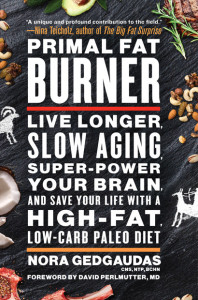Q: My twin sister and I have PCOS (Polycystic Ovarian Syndrome). For years we have been told various ways of eating that supposedly are going to get rid of the symptoms (such as insulin resistance, infertility, belly fat, etc). We have become so confused by all the “advice” we have been given that we have thrown our hands up and now eat whatever we want. Do you have any input on the optimum diet for women affected by PCOS?
A: PCOS typically occurs in women of reproductive age and has been associated with obesity, high blood testosterone levels, increased facial and body hair growth, problems with ovulation and infertility. 80% of the time PCOS is associated with obesity–and essentially 100% of the time obesity is directly associated with insulin and leptin resistance. This is unfortunately the tip of the iceberg, however. PCOS is part of a vicious inflammatory cycle initiated by insulin resistance that leads to androgen (testosterone) dominance…which in turn further exacerbates insulin resistance. The intermediate catalyst appears to be either the adrenals or the ovaries. Most commonly, an enzyme in the ovaries called 17, 20 lyase gets up-regulated in the presence of insulin and chronically converts estrogen to testosterone.
Sometimes birth control pills get prescribed for this but that only really results in shutting down the hormonal feedback loops and does nothing to repair the problem. Adding extra estrogen isn’t the answer, since any added estrogen will likely only be converted to testosterone eventually and further exacerbate the problem.
The best single way to address this disorder is eat in a manner that restores insulin sensitivity. The dietary approach I talk about in my book, Primal Body-Primal Mind is powerfully geared toward balancing of hormones such as insulin and leptin and greatly improving insulin sensitivity. DIET DOES MATTER!! The more you can do to metabolically adapt yourself to fat burning instead of sugar burning the better off you will be (and for this, the dietary approach I advocate is about as optimum as you can get). My article on “Taming the Carb Craving Monster” may have some additional information you may find useful.
One more factor I urge you to consider is iodine deficiency. Iodine deficiency tends to be a factor wherever cysts are an issue and has been strongly linked to PCOS. Ordering an iodine test (being sure to include a bromide toxicity test) from Hakala Labs could be an important step to take in resolving your PCOS issue. Always test first prior to iodine supplementation or iodine loading. If you know or suspect you may have thyroid issues and/or Hashimoto’s (positive for TPO antibodies) then I recommend you proceed with extreme caution and consult with an experienced clinician prior to any iodine supplementation.
~ Nora
NOTE:
The ideas and suggestions written by Nora Gedgaudas on this website or blog are provided as general educational information only and should not be construed as medical advice or care. All matters regarding your health require supervision by a personal physician or other appropriate health professional familiar with your current health status. Always consult your qualified personal health care provider before making any dietary or exercise changes. Nora Gedgaudas and Northwest Neurofeedback, Inc. disclaims any liability or warranties of any kind arising directly or indirectly from use of this website or blog. If any medical problems develop, always consult your qualified personal health care provider. Only your physician can provide you medical advice.



Good advice. I hadn’t heard about the iodine connection before–and I’ve just been diagnosed with Hashimoto’s as well.
I did want to say that it’s not entirely accurate that PCOS is a weight issue.–it’s more complex than that. There are thin PCOSers and I myself likely came by my PCOS via long term prednisone use for asthma, which resulted in Cushings and then adrenal suppression.
Regardless, a low glycemic diet is the way to go.
M
And for the record, I didn’t say that PCOS is always a weight issue, either. It’s an insulin resistance issue. It IS possible to be thin and insulin resistant.